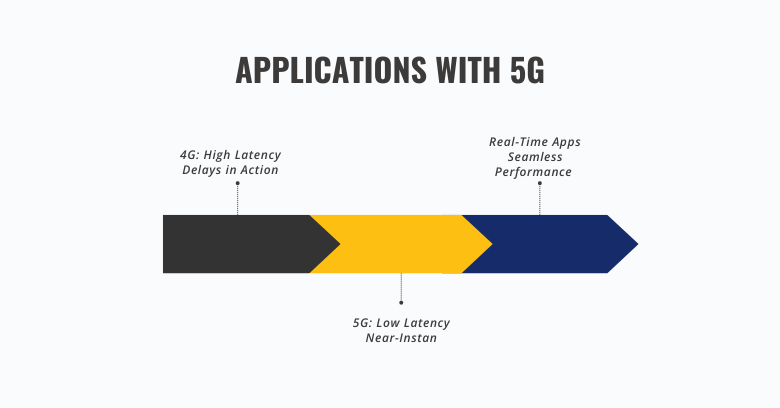Introduction
The introduction of 5G technology marks a pivotal moment for the tech industry, especially in the realm of 5G and mobile app development. With speeds up to 100 times faster than 4G, reduced latency, and increased bandwidth, 5G has the potential to revolutionize mobile app development. This next-generation network brings opportunities for more immersive and real-time experiences, allowing developers to create apps that were previously unimaginable due to technological limitations. As 5G continues to roll out across the globe, developers must adapt to the new landscape and leverage the capabilities of this technology to meet the growing demand for high-performance mobile applications.
In this article, we’ll dive into the impact of 5G and mobile app development, explore the innovations it enables, and discuss how developers can stay ahead of the curve in the 5G era.
The Fundamentals of 5G Technology
5G, the fifth-generation wireless network, builds on its predecessors (3G and 4G) by introducing several improvements, including faster data transfer speeds, lower latency, and the ability to connect more devices simultaneously. Here’s a quick look at some of the key features that make 5G transformative:
- Faster Speeds: 5G can deliver download speeds of up to 10 Gbps, drastically reducing the time it takes to load applications and content.
- Low Latency: Latency, the time it takes for data to travel between devices, can be as low as 1 millisecond with 5G. This enables near-instantaneous communication and real-time processing.
- Increased Connectivity: 5G networks can support up to one million devices per square kilometer, making it ideal for the growing number of connected devices in the Internet of Things (IoT) ecosystem.
- Improved Bandwidth: With more bandwidth, 5G can handle a larger amount of data, enabling more advanced applications such as augmented reality (AR), virtual reality (VR), and 4K/8K video streaming.
These improvements form the foundation of how 5G and mobile app development will evolve, driving the next generation of mobile experiences.
The Impact of 5G on Mobile App Development
The advent of 5G is set to transform mobile app development in several key areas. From real-time interactivity to enhanced user experiences, 5G and mobile app development will introduce new possibilities for both developers and end-users.
1. Real-Time Applications and Enhanced Performance
One of the most significant impacts of 5G on mobile app development is the ability to create true real-time applications. With 5G’s ultra-low latency, developers can build apps that respond instantly to user actions. This is especially important for applications in sectors such as gaming, streaming, and telemedicine.
Example Use Case: Online multiplayer games will benefit from 5G’s lower latency, allowing for seamless gameplay with no lag or delays. Players will be able to compete in real time, regardless of their location, creating a more immersive and engaging experience.
Additionally, real-time video streaming applications, such as video conferencing tools, will be more reliable and efficient, providing crystal-clear video and audio with minimal lag. This will be especially beneficial for remote work environments where smooth communication is crucial.

2. Enhanced User Experiences with AR and VR
With 5G’s improved speed and capacity, mobile app developers can create more immersive user experiences, particularly in areas such as augmented reality (AR) and virtual reality (VR). Previously, AR and VR applications were limited by the network’s ability to process large amounts of data in real-time. With 5G, these limitations are greatly reduced, allowing developers to build apps that offer smooth, high-quality AR and VR experiences.
Example Use Case: Retail apps can integrate AR features, allowing users to try on clothes virtually or visualize how furniture will look in their homes in real-time. Similarly, VR apps for gaming or remote collaboration can create fully immersive environments with minimal latency and high visual fidelity.
Impact of 5G on AR/VR:
- Smoother Interactions: AR and VR experiences will be more fluid and responsive, creating a sense of immediacy for the user.
- Better Graphics and Resolution: 5G allows for higher-quality graphics, enabling detailed AR overlays and lifelike VR environments.
- Remote Collaboration: 5G-powered AR/VR can enable remote collaboration in fields like architecture, where teams can visualize 3D models together in real-time.
3. Cloud-Driven Apps and Edge Computing
The faster speeds and lower latency of 5G enable more powerful cloud-driven applications. With 5G, data processing can shift from the device to the cloud or the network edge, known as edge computing. This approach allows applications to offload complex tasks, such as machine learning algorithms or data-intensive operations, to cloud servers or edge nodes rather than handling them locally.
Example Use Case: Applications in industries such as healthcare can leverage 5G for real-time medical imaging analysis or remote diagnostics, where the heavy lifting of data processing happens in the cloud, and results are delivered instantly to the mobile device.
By enabling more powerful cloud and edge computing solutions, 5G and mobile app development will create new possibilities for apps that require high-performance processing and quick response times.
4. IoT and Smart Devices Integration
5G also accelerates the adoption of the Internet of Things (IoT) by enabling better connectivity between mobile apps and smart devices. With the ability to support millions of connected devices per square kilometer, 5G will allow developers to create mobile applications that seamlessly integrate with smart devices in homes, cities, and industries.
Example Use Case: In smart homes, mobile apps can control multiple connected devices in real-time, from thermostats to security cameras and lighting systems. Thanks to 5G, these interactions will be instantaneous, allowing for smoother and more integrated user experiences.
For developers, 5G and mobile app development will also drive new use cases in areas like smart cities, industrial automation, and autonomous vehicles, where real-time communication between devices is essential for optimal performance.
5. Improved Security and Privacy Protocols
As mobile apps become more powerful and connected with 5G, developers must prioritize security and privacy. The massive increase in connected devices and real-time data transmission raises concerns about data security. However, 5G networks also offer enhanced security features that developers can leverage to build more secure mobile apps.
Security Features of 5G:
- Network Slicing: 5G enables the creation of dedicated network slices for specific applications, which can be secured individually, reducing the risk of cyberattacks.
- Enhanced Encryption: 5G uses advanced encryption standards to protect data transmitted across the network, safeguarding sensitive information.
- Device Authentication: 5G improves device authentication protocols, ensuring that only authorized devices can access the network.
Developers will need to integrate these security features into their applications to ensure that users’ data is protected, especially in fields like finance, healthcare, and government.
Key Considerations for Developers in the 5G Era
As 5G continues to roll out globally, developers should consider the following factors when building next-generation mobile applications:
1. Focus on Optimizing for Speed and Efficiency
With 5G’s faster speeds, users will expect mobile applications to load instantly and perform without lag. Developers should prioritize optimization for speed and ensure that apps are lightweight, efficient, and responsive to take full advantage of 5G’s capabilities.
2. Design for Real-Time Interactions
Incorporating real-time features will become essential as users expect immediate responses and seamless interactions in their mobile apps. Whether it’s real-time gaming, video streaming, or interactive shopping experiences, developers must design apps that can handle real-time data and user inputs with ease.
3. Leverage Cloud and Edge Computing
Developers should explore how to integrate cloud and edge computing into their mobile apps. Offloading data processing to the cloud or network edge can dramatically improve app performance and enable the development of more complex applications that would otherwise be limited by device constraints.
4. Build for IoT Connectivity
The growing number of connected devices in the IoT space presents new opportunities for mobile app developers. Developers should consider how their apps can integrate with smart devices and provide users with seamless control and monitoring capabilities.
5. Prioritize Security in a Connected World
With the increase in connected devices and data transmission enabled by 5G, security will be more critical than ever. Developers must stay up-to-date on the latest security protocols and incorporate strong encryption, authentication, and data privacy measures into their apps.
What Developers Should Anticipate for the Future
As 5G networks become more widespread, mobile app developers will have even more opportunities to innovate and create applications that redefine user experiences. From real-time AI-powered apps to immersive AR and VR environments, 5G and mobile app development will unlock new possibilities for developers in every industry.
Developers who are early adopters of 5G technology will be well-positioned to lead the next wave of innovation, creating apps that not only meet but exceed user expectations in terms of speed, interactivity, and functionality.
Key Takeaways:
- 5G and mobile app development are transforming the landscape of real-time applications, offering faster speeds, lower latency, and improved connectivity.
- Real-time apps, AR/VR experiences, cloud-driven applications, and IoT integration are among the key areas where 5G will have the most impact on mobile app development.
- Developers must optimize apps for speed, leverage cloud and edge computing, design for IoT connectivity, and prioritize security in the 5G era.
- With 5G continuing to roll out, developers should anticipate even greater opportunities for innovation, creating next-generation apps that revolutionize user experiences.
By embracing 5G and mobile app development, developers can unlock the full potential of this technology and build applications that shape the future of how we interact with the digital world.




